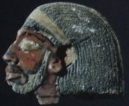- The continual burnt offering (Tamid sacrifice) must be offered twice daily. (Numbers 28:2-6)
- The grain and drink offering must be offered twice daily. (Numbers 28:2-8)
- An additional sacrifice must be offered every Sabbath. (Numbers 28:9-10)
- An additional sacrifice must be offered on The New Moon. (Numbers 28:11-15)
- An additional sacrifice must be offered every day of The Feast of Unleavened Bread (Passover). (Numbers 28:18-24)
- The Omer offering of the first barley must also be brought on the first day of The Feast of Unleavened Bread (Passover) and must be waved by the priests on the second day of the Feast. (Leviticus 23:10-14)
- An additional offering must be offered at The Feast of Weeks (Pentecost). (Numbers 28:26-30)
- Two wave loaves of bread baked with salt must be offered on The Feast of Weeks (Pentecost). (Leviticus 23:17)
- An additional sacrifice must be offered on The Feast of Trumpets. (Numbers 29:1-6)
- An additional sacrifice must be offered on the Day of Atonement. (Numbers 29:7-8)
- The Atonement Service must be performed on the Day of Atonement. (Leviticus 16:2-34)
- An additional sacrifice must be offered every day of The Feast of Tabernacles. (Numbers 29:12-34)
- An additional sacrifice must be offered on The Last Great Day. (Numbers 29:35-40)
- Three times a year keep a Feast to Yahawah: at The Feast of Unleavened Bread, at The Feast of Weeks (Pentecost), and at The Feast of Tabernacles. (Exodus 23:14-17)
- The Feasts of Yahawah must be kept only at the Place Yahawah chooses, at the sanctuary of Yahawah . (Deuteronomy 12:5-7, 14)
- Every household must appear before Yahawah and rejoice at the Feasts. (Deuteronomy 16:14)
- The Passover Lamb must be killed on the fourteenth day of Abib between the two evenings. (Numbers 28:16)
- The Passover Lamb must be eaten on the night of the fifteenth of Abib.(Exodus 12:8-11)
- Those who are unclean from a dead body or away on a journey (stranded, detained, or imprisoned) must kill the Passover Lamb in the Second Moon. (Numbers 9:10-11)
- The Passover in the Second Moon must be held according to all its ordinances. (Numbers 9:11-12)
- The silver trumpets must be sounded at Feast times, New Moons, and also in times of tribulation, to call the congregation together. (Numbers 10:2, 9-10)
- All animals to be sacrificed must be at least eight days old. (Leviticus 22:27)
- All animals to be sacrificed must be without blemish. (Leviticus 22:21)
- All offerings must be salted. (Leviticus 2:13)
- The Law of the burnt offering. (Leviticus 1:2-17)
- The Law of the sin offering. (Leviticus 6:25-30)
- The Law of the trespass offering. (Leviticus 7:1-2, 7)
- The Law of the peace offering. (Leviticus 3:1-17)
- The Law of the grain offering. (Leviticus 2:1-16)
- If the congregation sins ignorantly, a sin offering must be brought. (Leviticus 4:13-21)
- If a person sins ignorantly, a sin offering must be brought when he learns of his sin. (Leviticus 4:27-35)
- If a person is in doubt as to whether he has sinned in regard to any of the holy things, a suspensive guilt offering must be brought. (Leviticus 5:15-19)
- A sin offering must be brought for stealing, swearing falsely, and sins of a like nature. (Leviticus 6:1-7)
- The sin offering must be according to one’s means. (Leviticus 5:7-13)
- We must confess our sins to Yahawah , repent for them, and be converted to the keeping of Yahawah’s Laws. (Numbers 5:6-7)
- A man who has an abnormal discharge (zab) must bring a sacrifice. (Leviticus 15:13-15)
- A woman who has an abnormal discharge (zabah) must bring a sacrifice. (Leviticus 15:28-30)
- A woman must bring a sacrifice after childbirth. (Leviticus 12:6-8)
- A leper must bring a sacrifice after he has been cleansed. (Leviticus 14:1-32)
- The First Tithe is holy, and belongs to Yahawah. (Leviticus 27:30-33)
- The firstborn of clean animals are holy and belong to Yahawah. (Exodus 13:2)
- The firstborn sons belong to Yahawah, but may be redeemed. (Exodus 34:19-20)
- The firstling of a donkey must be redeemed. (Exodus 34:20)
- If the firstling of a donkey is not redeemed, its neck must be broken. (Exodus 13:13)
- All tithes and offerings must be brought to the sanctuary of Yahawah. (Deuteronomy 12:5-6)
- The sanctuary of Yahawah is the only place Yahweh has chosen to receive tithes, sacrifices, and offerings. (Deuteronomy 12:13-14, 26)
- The blood of the sacrifices must be poured out on the altar of Yahawah for our atonement. (Deuteronomy 12:27)
- Sanctified animals which have become blemished must be redeemed. (Deuteronomy 15:19-22)
- Any animal exchanged for an offering is also holy. (Leviticus 27:10, 33)
- The priests are to eat the meat of the consecrated offerings. (Exodus 29:33)
- The priests are to eat the remainder of the grain offering. (Leviticus 10:12-13)
- Consecrated meat of an offering which becomes ritually unclean must be burned. (Leviticus 7:19)
- Consecrated meat of an offering not eaten within its appointed time must be burned. (Leviticus 7:17)

Hebrew Israelite Online Resource | Know Ye Not?
The phrase “know ye not” or rather, "Didn't You Know" is used 15 times in the English New Testament. This site examines what it is the writers felt important that should have been understood by the early HEBREW ASSEMBLIES.